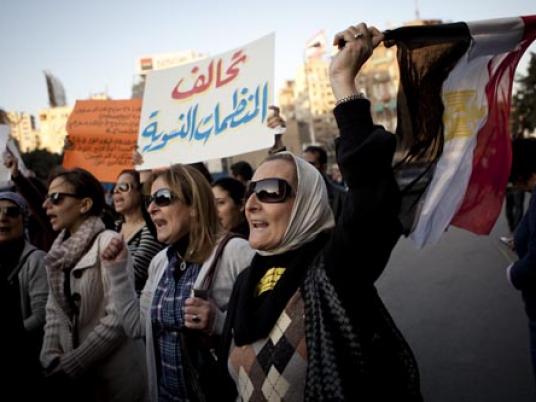
Human rights organizations called Thursday for a firm stance against the "intentional" harassment of women during protests.
The organizations said in a statement that the amount of sexual harassment and violence against female demonstrators in Tahrir Square and the surrounding streets has been "worryingly" increasing since the outbreak of the recent wave of protests following the verdict issued against former President Hosni Mubarak and senior Interior Ministry officials on 2 June.
Among the organizations that signed the statement were the Alliance of Feminist Organizations, the Feminist Egyptian Union, the Anti-Violence Union, and the women’s committees of the Egyptian Social Democratic Party, the Socialist Popular Alliance Party, and the Egyptian Socialist Party.
The statement said: "Such acts succeed, unfortunately, in keeping women away from protests, especially during the night hours when female presence is significantly lower in the square compared to former [protests.]"
The organizations stressed that the attacks suffered by female demonstrators, which violate the sanctity of their bodies and their physical safety, represent a barrier limiting the participation of women in the public sphere and disabling them from shaping the present and future of the country.
Noha, who was attacked in the square, said: "The square was very crowded on Sunday and I was sexually harassed but could not make out the attacker because it was so crowded. Since that day, I haven't gone to the square, and I don't intend to participate in any more demonstrations or marches, because I do not want to be harassed."
No official numbers exist for attacks on women in the square because police do not go near the area, and women rarely report such incidents. But activists and protesters have reported a number of particularly violent assaults on women in the past week.
Many suspect such assaults are organized by opponents of the protests to weaken the spirit of the protesters and drive people away.
Women also have been targeted in recent crackdowns on protesters by military and security troops, a practice commonly used by Mubarak security that grew even more aggressive in the days following his ouster. In a defining image of the post-Mubarak state violence against women, troops were captured on video stomping with their boots on the bare chest of a woman, with only her blue bra showing, as other troops pulled her by the arms across the ground.
A 2008 report by the Egyptian Center for Women's Rights says two-thirds of women in Egypt experienced sexual harassment on a daily basis. A string of mass assaults on women in 2006 during the Muslim feast following the holy month of Ramadan prompted police to increase the number of patrols to combat it but legislation providing punishment was never passed.




